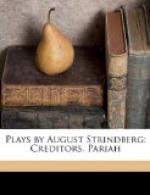There are so many ways of presenting truth. Strindberg’s is only one of them—and not the one commonly employed nowadays. Its main fault lies perhaps in being too intellectual, too abstract. For while Strindberg was intensely emotional, and while this fact colours all his writings, he could only express himself through his reason. An emotion that would move another man to murder would precipitate Strindberg into merciless analysis of his own or somebody else’s mental and moral make-up. At any rate, I do not proclaim his way of presenting truth as the best one of all available. But I suspect that this decidedly strange way of Strindberg’s—resulting in such repulsively superior beings as Gustav, or in such grievously inferior ones as Adolph—may come nearer the temper and needs of the future than do the ways of much more plausible writers. This does not need to imply that the future will imitate Strindberg. But it may ascertain what he aimed at doing, and then do it with a degree of perfection which he, the pioneer, could never hope to attain.
CREDITORS
A TRAGICOMEDY
1889
PERSONS
TEKLA
Adolph, her husband, a painter
Gustav, her divorced husband, a high-school teacher (who is travelling under an assumed name)
SCENE
(A parlor in a summer hotel on the sea-shore. The rear wall has a door opening on a veranda, beyond which is seen a landscape. To the right of the door stands a table with newspapers on it. There is a chair on the left side of the stage. To the right of the table stands a sofa. A door on the right leads to an adjoining room.)
(ADOLPH and GUSTAV, the latter seated on the sofa by the table to the right.)
Adolph. [At work on a wax figure on a miniature modelling stand; his crutches are placed beside him]—and for all this I have to thank you!
Gustav. [Smoking a cigar] Oh, nonsense!
Adolph. Why, certainly! During the first days after my wife had gone, I lay helpless on a sofa and did nothing but long for her. It was as if she had taken away my crutches with her, so that I couldn’t move from the spot. When I had slept a couple of days, I seemed to come to, and began to pull myself together. My head calmed down after having been working feverishly. Old thoughts from days gone by bobbed up again. The desire to work and the instinct for creation came back. My eyes recovered their faculty of quick and straight vision—and then you showed up.
Gustav. I admit you were in a miserable condition when I first met you, and you had to use your crutches when you walked, but this is not to say that my presence has been the cause of your recovery. You needed a rest, and you had a craving for masculine company.




